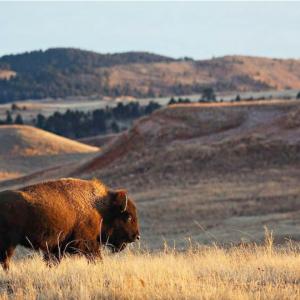March 16 NC CASC webinar
Date
Building a Climate Adaptation Plan for the Sicangu Lakota (Rosebud Sioux)
Thursday, March 16, 2023, 11 AM - 12 PM MT Presented by:
Philimon Two Eagle (Sicangu Lakota Treaty Council), Paula Wopilawan Antoine (Coordinator, Sicangu Oyate Land Office), Robin O'Malley (Robin O'Malley, LLC; formerly the USGS Director of NC CASC)
Register in advance for this meeting.
After registering, you will receive an email confirmation containing information about how to join the meeting.
Abstract:
The Sicangu Lakota (Rosebud Sioux) tribe recognizes the climate crisis we are facing, and is planning to adapt and thrive. The recently adopted Climate Adaptation Plan for the Sicangu Lakota Oyate recognizes the crisis, incorporates the knowledge of elders, and identifies priority actions the community can take. Recommendations fall into: Protecting the Oyate (community) -- focused on life and property protection and severe weather; protecting our water -- acknowledging Rosebud's relative good fortune regarding water, but identifying critical steps to ensure its protection; and protecting the land and living relatives -- which acknowledges the potential for significant change due to climate change. The plan also recommends creation of a Sicangu Climate Center to hold and manage data and information about the tribe's lands, air, water, people, and climate and to use these to reinforce tribal sovereignty.
About the speakers:
Philimon D. Two Eagle is the Executive Director of the Sicangu Lakota Treaty Council in Rosebud, South Dakota. Mr. Two Eagle has been working on preserving the inherent rights and treaty rights of the Sicangu Lakota Oyate (the Rosebud Sioux Tribe). He believes in preserving his Lakota language as he recognizes Language as the source of Inherent Sovereignty and a connection to the ancestors. Mr. Two Eagle works with the elders and Spiritual leaders, Traditional knowledge, treaty rights, Lakota language, Climate Crisis and the Environment with the Oceti Sakowin Oyate (the Seven Council Fires) of the Lakota, Dakota and Nakota people to have the US Federal Government honor the Fort Laramie treaties that they signed with the Lakota people. He believes the Tiwahe (the family unit) as the very first form of Lakota traditional government and that life teachings begin in the Tiwahe. The Tiwahe is also the very first line of education for the children. Mr. Two Eagle wants the Oyate to return to Tiwahe and to begin the process of healing; his work leads him to build an indigenous economy together to return to the circle.
Paula “Wicocan Awayaka Win” Antoine is the Director of the Sicangu Oyate Land Office and a member of the Sicangu Climate Crisis Working Group. As a lifelong protector and supporter of Unci Maka - Mother Earth, our land, people and resources through engagement in legislative and associated activities including cultural and traditional aspects. She hopes to ensure the culture and traditions of the Lakota nation will continue to help our people to live in these challenging times.
Robin O'Malley retired in 2020 from a long career in government and non-profit doing conservation work. He currently works for the Sicangu Lakota (Rosebud Sioux) in developing a climate adaptation plan and implementing a Sicangu Climate Center to manage the community's data and information and to use it to strengthen their community and sovereignty. He also advises the Bureau of Land Management on the identification and use of climate science and information, as a pro bono activity. Prior to retiring, Robin directed the North Central Climate Adaptation Science Center (CASC) and served as the Policy and Partnership Coordinator during the development of the CASC network. He directed the production of The State of the Nation's Ecosystems, while at the H. John Heinz III Center for Science, Economics and the Environment. He has served as Chief of State at the National Biological Survey, Deputy Science Advisor to Interior Secretary Babbitt, Associate Director for Natural Resources at the White House Council on Environmental Quality, environmental advisor to Governor Thomas H. Kean (NJ), and at several positions in the New Jersey Department of Environmental Protection. He has a Masters from Harvard's Kennedy School, and a bachelors from the State University of New York.


